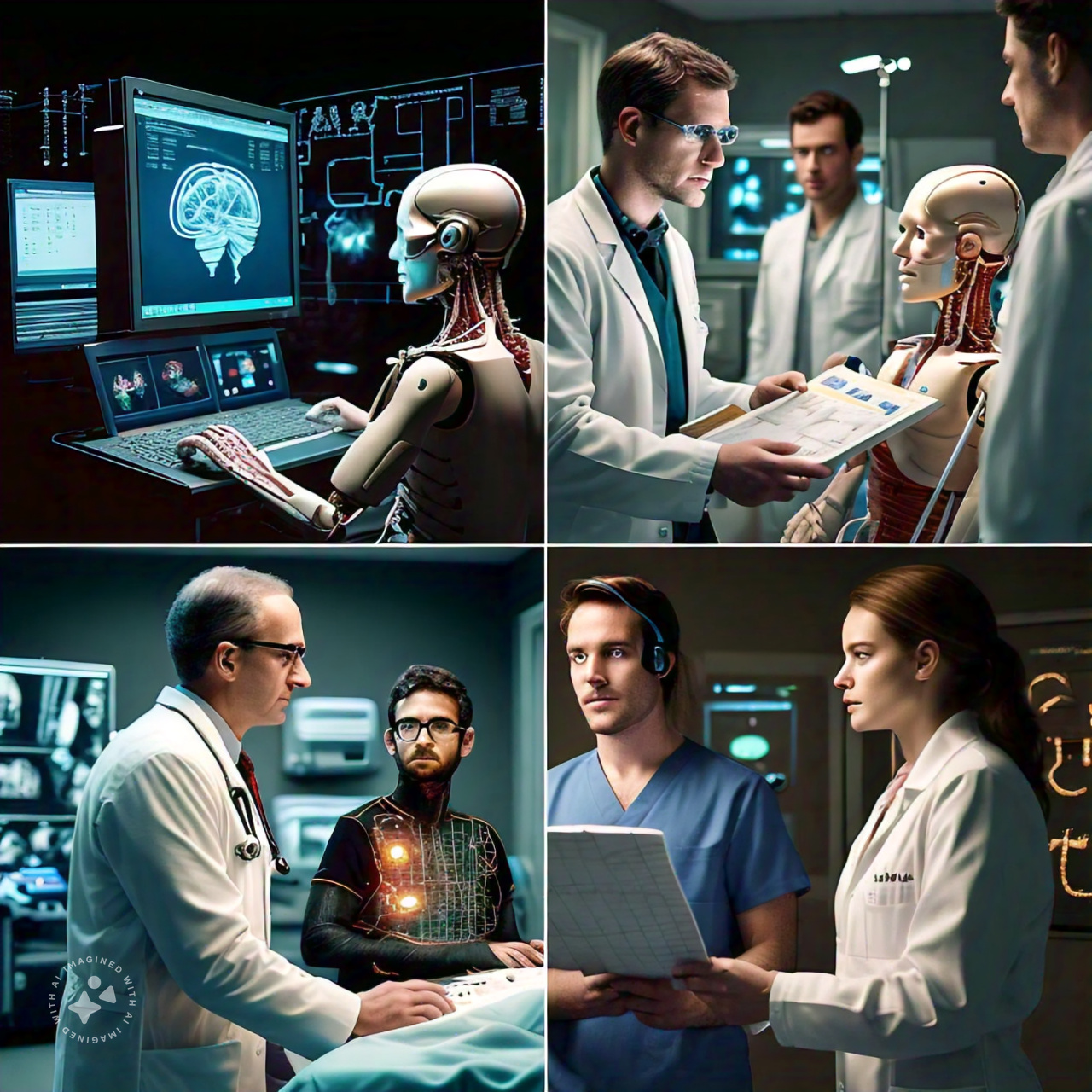The Evolution of Artificial Intelligence in Healthcare
Introduction
Artificial intelligence (AI) is revolutionizing healthcare, driving innovations that enhance patient outcomes, streamline clinical processes, and reduce costs. As AI continues to evolve, its impact on healthcare is becoming more profound, from diagnostics to personalized medicine. This article delves into AI’s journey in healthcare, its present-day applications, challenges, and future potential, highlighting how this technology is reshaping the healthcare landscape.
History of AI in Healthcare
AI’s roots in healthcare trace back to the 1960s, with the development of early expert systems. These systems were designed to emulate human reasoning, assisting in diagnosing diseases and recommending treatments. The 1980s brought a surge of rule-based systems, which further refined the decision-making processes in medical settings. By the 1990s, machine learning algorithms began to gain traction, allowing computers to learn from medical data and improve over time. These foundational technologies laid the groundwork for today’s sophisticated AI applications, which now use deep learning and advanced algorithms to make accurate predictions and diagnoses.
Current Applications of AI in Healthcare
AI’s current impact on healthcare is broad and multifaceted. It plays a crucial role in several areas, including:
1. Medical Imaging Analysis
AI-driven tools have become indispensable in radiology and other imaging fields. AI algorithms can analyze X-rays, MRIs, and CT scans with precision, identifying patterns and abnormalities that may be missed by human eyes. These tools help radiologists make faster and more accurate diagnoses, ultimately improving patient outcomes.
2. Clinical Decision Support Systems
AI-powered decision support systems are transforming patient care. These systems analyze patient data, medical history, and current symptoms to provide personalized treatment recommendations. Physicians use these insights to make informed decisions, ensuring that patients receive the best care possible.
3. Predictive Analytics
AI’s predictive capabilities are particularly valuable in identifying high-risk patients and preventing hospital readmissions. By analyzing vast amounts of patient data, AI can predict future health issues, allowing clinicians to take preventive measures before complications arise.
4. Virtual Assistants
AI-powered virtual assistants and chatbots are improving patient engagement and self-management. These tools provide 24/7 access to medical information, helping patients monitor their health, schedule appointments, and receive medication reminders, all from the comfort of their homes.
Challenges and Limitations of AI in Healthcare
Despite AI’s transformative potential, several challenges hinder its widespread adoption in healthcare:
1. Data Quality and Integration
AI systems require vast amounts of high-quality data to function optimally. However, healthcare data is often unstructured, fragmented, and siloed across different systems, making it difficult for AI to operate efficiently.
2. Algorithmic Bias
AI models are only as good as the data they are trained on. If that data reflects existing biases in healthcare, AI can perpetuate and even exacerbate inequalities, leading to inaccurate or biased outcomes.
3. Regulatory Frameworks
Healthcare is a highly regulated industry, and AI’s integration requires clear and robust regulatory frameworks to ensure patient safety, data security, and ethical use. The lack of such frameworks has slowed down AI adoption.
4. Cybersecurity Concerns
AI systems in healthcare manage sensitive patient data, making them prime targets for cyberattacks. Ensuring the confidentiality, integrity, and security of patient data remains a significant challenge for AI systems.
Future Prospects of AI in Healthcare
The future of AI in healthcare holds enormous potential, with innovations that promise to further enhance patient care:
1. Personalized Medicine
AI will play a critical role in the advancement of personalized medicine, where treatments are tailored to an individual’s genetic makeup. By analyzing genomic data, AI can help develop targeted therapies that offer higher success rates and fewer side effects.
2. Telehealth Expansion
AI-driven telehealth platforms are set to revolutionize healthcare access, particularly in underserved and remote areas. Virtual consultations powered by AI can provide expert advice to patients anywhere in the world, reducing the need for in-person visits.
3. Accelerated Medical Research
AI’s ability to analyze large datasets quickly makes it a valuable tool in medical research. From drug discovery to understanding disease mechanisms, AI will accelerate research timelines, helping bring new treatments to market faster.
Case Studies in AI Healthcare Success
Several AI-powered systems have already proven successful in transforming healthcare:
1. IBM Watson Health
IBM Watson Health has made significant strides in cancer diagnosis and treatment planning. By analyzing vast amounts of medical literature and patient data, Watson provides oncologists with tailored treatment recommendations, helping to improve patient outcomes.
2. Google DeepMind
Google’s DeepMind AI is being used in ophthalmology to detect and diagnose eye diseases from medical imaging. This system has shown remarkable accuracy in identifying conditions such as diabetic retinopathy and age-related macular degeneration, offering hope for early intervention and treatment.
AI in Healthcare: Benefits and Drawbacks
AI offers numerous benefits, including enhanced accuracy, faster diagnostics, and personalized treatment options. However, there are also drawbacks to consider, such as potential job displacement among healthcare workers, the risk of algorithmic errors, and ethical concerns related to data privacy and bias.
AI Adoption in Healthcare: Trends and Forecasts
AI adoption in healthcare is on an upward trajectory, with estimates predicting the market for AI-powered healthcare tools will grow exponentially in the coming decade. Key trends include the integration of AI into electronic health records (EHRs), the rise of AI-driven telemedicine, and advancements in AI-powered robotics for surgery and rehabilitation.
The Role of AI in Healthcare: Patient Perspective
From a patient’s perspective, AI offers convenience, improved access to healthcare, and more personalized care. However, some patients may have concerns about AI’s involvement in their care, particularly when it comes to privacy and the lack of human interaction in AI-driven services.
Conclusion
AI has transformed healthcare, bringing unprecedented improvements in diagnosis, treatment, and patient care. Its evolution over the past decades has revolutionized how healthcare providers approach complex medical challenges. However, for AI to reach its full potential, it is essential to address existing challenges such as data integration, algorithmic bias, and regulatory concerns. By doing so, healthcare can continue to leverage AI’s capabilities to enhance patient outcomes and revolutionize medical practice.
Recommendations
To ensure AI’s continued success in healthcare, the following steps should be prioritized:
1. Invest in AI Research and Development: Continued investment in AI technologies is crucial for further innovation and enhanced capabilities.
2. Establish Clear Regulatory Frameworks: Governments and healthcare organizations must work together to develop comprehensive regulations that ensure patient safety and ethical AI use.
3. Prioritize Data Quality and Integration: Ensuring that healthcare data is standardized, accessible, and of high quality is key to maximizing AI’s effectiveness.
Related Article
Meta Unveils Revolutionary AI Innovations: Redefining Content Creation and Interaction
